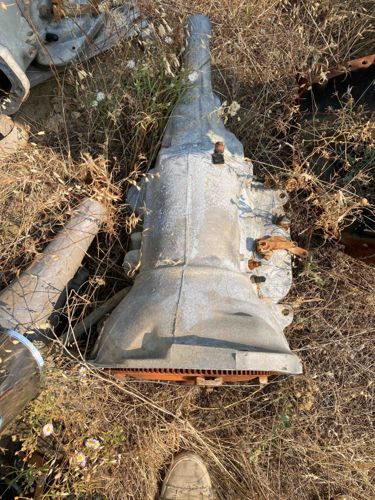
Automatic Transmission Unit
The item depicted is a large, cast metal automatic transmission unit, likely from an older model vehicle. Its primary material appears to be aluminum or a similar light gray alloy, showing significant weathering and oxidation. The casing is a dull, chalky gray color with areas of discoloration and dirt accumulation, indicating prolonged outdoor exposure. The unit is somewhat conical in shape, tapering towards the rear output shaft area, and features several protruding components and mounting points. Visible features include a bell housing at the wider end, designed to connect to an engine, with internal fins or teeth visible within its opening, which are heavily rusted and orange in color. There are various external bosses, ports, and what appear to be sensor or actuator mounts, many of which are rusted or corroded, particularly a prominent dark, cylindrical component with an orange/brown cap on the upper right side. The overall construction exhibits robust casting, indicative of its functional purpose in a powertrain. There are no clear manufacturer's marks or serial numbers visible in the provided image. The rough texture and dull finish suggest a component that has been discarded or left in a salvage yard for an extended period. Its estimated age is difficult to pinpoint precisely without more information, but the design suggests it could be from the mid-to-late 20th century. The visible condition issues are consistent with significant exposure to the elements, including corrosion, surface oxidation, and general grime, which would likely require extensive restoration or suggest it is only suitable for scrap.
AI-Generated Appraisal Disclaimer
Estimated Value
$50 - $150
Basic Information
Category
Automotive Part
Appraised On
February 26, 2026
Estimated Value
$50 - $150
Item Description
The item depicted is a large, cast metal automatic transmission unit, likely from an older model vehicle. Its primary material appears to be aluminum or a similar light gray alloy, showing significant weathering and oxidation. The casing is a dull, chalky gray color with areas of discoloration and dirt accumulation, indicating prolonged outdoor exposure. The unit is somewhat conical in shape, tapering towards the rear output shaft area, and features several protruding components and mounting points. Visible features include a bell housing at the wider end, designed to connect to an engine, with internal fins or teeth visible within its opening, which are heavily rusted and orange in color. There are various external bosses, ports, and what appear to be sensor or actuator mounts, many of which are rusted or corroded, particularly a prominent dark, cylindrical component with an orange/brown cap on the upper right side. The overall construction exhibits robust casting, indicative of its functional purpose in a powertrain. There are no clear manufacturer's marks or serial numbers visible in the provided image. The rough texture and dull finish suggest a component that has been discarded or left in a salvage yard for an extended period. Its estimated age is difficult to pinpoint precisely without more information, but the design suggests it could be from the mid-to-late 20th century. The visible condition issues are consistent with significant exposure to the elements, including corrosion, surface oxidation, and general grime, which would likely require extensive restoration or suggest it is only suitable for scrap.
Related Tags
Get Your Items Appraised
Instant estimates of your treasures with AI-powered instant appraisals